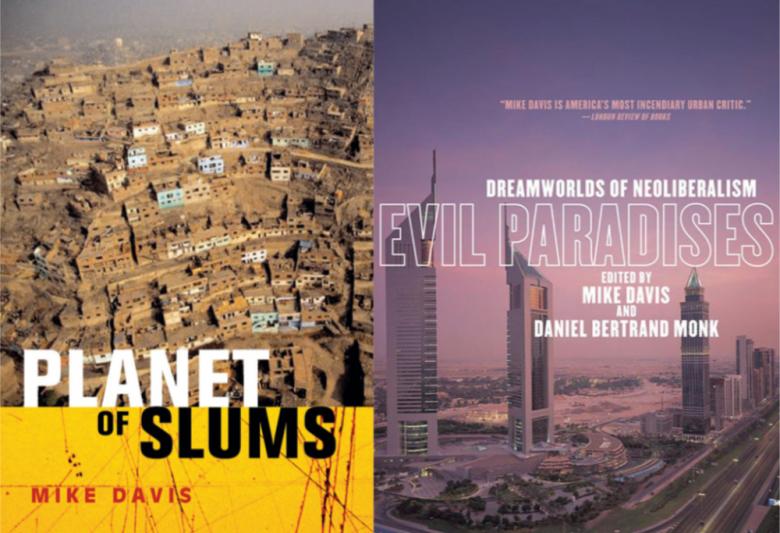Mike Davis, 1946–2022
John Hill
26. October 2022
The Mike Davis books in my library: City of Quartz: Excavating the Future in Los Angeles (Verso, 1990) and Ecology of Fear: Los Angeles and the Imagination of Disaster (Metropolitan Books, 1998). (Photo: John Hill/World-Architects)
Social critic Mike Davis, best known for chronicling the dark side of sunny Los Angeles, died on October 25 at his home in San Diego from complications related to esophageal cancer. He was 76.
Writing in a tribute to Michael Sorkin on the day of his death in March 2020, Mike Davis asserted that "if some people consider me an 'urban theorist' it’s only because in 1992 Michael conscripted me to write a chapter in his volume Variations in [sic] a Theme Park." Davis's contribution, "Fortress Los Angeles: The Militarization of Public Space," is very much in line with a book subtitled "The New American City and the End of Public Space." It is also lifted from Davis's second book, his groundbreaking, fame-making and prescient book from two years earlier: City of Quartz: Excavating the Future in Los Angeles.
Davis's 1990 book was included in a list of ten books Sorkin determined urban design students must read, which I did in summer 2006 before attending the Sorkin-helmed urban design program at City College of New York (CCNY). City of Quartz has remained important and influential to architects, planners, Angelenos, and others to this day, and it is usually the first book people think of when they hear Davis's name. It was celebrated on its 30th anniversary in 2020, described as "the best socio-political critique of modern L.A." and a prescient document that "anticipated the [Rodney King] uprising that followed two years later." The latter was solace of sorts for the many negative reviews coinciding with the release of Davis's anti-booster examination of Los Angeles's history and potential futures.
The future of the city is also the subject of Ecology of Fear: Los Angeles and the Imagination of Disaster, which arrived at the end of the decade that City of Quartz opened. People in Southern California have long had an "ecology of fear" over "the Big One": an earthquake so strong the loss of life would be in the hundreds of thousands. But Davis's book examine wildfires, wild animals, even tornadoes, finding that destructive natural phenomena are exacerbated by an irresponsible overtaking of the natural lands that make the region unique and the irresponsible treatment of different races and incomes in an area with a very polarized mix of inhabitants. It seems that, in the grips of climate change, social protests, and recurring droughts, among other concerns, the wider public has caught up to Davis's way of thinking.
Davis's Planet of Slums was published by Verso in 2006. Evil Paradises: Dreamworlds of Neoliberalism, edited by Davis with Daniel Bertrand Monk, was published by The New Press the following year.
Davis wrote more than a dozen other books over thirty years, from 1990 to 2020. Two titles especially relevant to architects and urbanists, in addition to City of Quartz and Ecology of Fear, are Planet of Slums, which arrived in 2006 as the urban population approached half of the global population, and Evil Paradises: Dreamworlds of Neoliberalism, which he edited with Daniel Bertrand Monk and described as a revisiting of, "on a global canvas, many of the concerns of Variations on a Theme Park." Both titles find neoliberalism at the core of global inequality and the realization of polar-opposite living conditions: "dystopian" slums for the poor and fortified, "utopian" enclaves for the rich.
No surprise that Davis was a Marxist and socialist, but one with working-class roots who applied academic theories to slum dwellers in India, for instance, and Latinos in Los Angeles. He somewhat famously drove a truck before eventually finding his niche as a social critic and public intellectual. Carolina A. Miranda writes in her LA Times obituary of Davis that he was "a generous scholar and mentor [who] was at home in all worlds, conferring with feminist theorist Susan Faludi one minute and a former Crip leader the next."
Davis was in the public spotlight to greater and lesser degrees since the unexpected success of City of Quartz, but this summer a flurry of articles profiled him after it was leaked on Twitter that he was foregoing chemotherapy for his terminal cancer in favor of palliative care, giving him just months to live. Coming across in the interviews and stories were, alongside the ecological devastation and critiques of irresponsible building, an optimistic belief in progressive activism and an inability to give into despair, calling it "useless."

